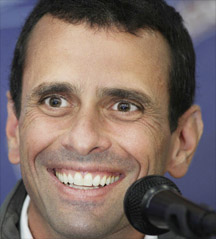SOCOPO, Venezuela (Reuters) – Deep in the rural home state of Venezuelan President Hugo Chavez that has for years been off limits for opposition politicians, rival candidate Henrique Capriles struggled to push through a throng of screaming supporters.
Small-time ranchers and farmers swarmed the muddy streets of Socopo, where the Venezuelan plains meet the Andes mountains, jostling to catch a glimpse of the candidate in a chaotic tumult reminiscent of the cattle herding typical of the region.
“They’re entering an area that was once solidly behind Chavez,” said Rafael Riera, 53, a rancher who voted for Chavez in five elections but now backs the opposition.

“All these people once believed in the president, now they don’t.”
Though well behind in the polls, Capriles’ campaign has made inroads into Vene-zuela’s vast rural expanses like Chavez’s home state of Barinas that have traditionally been a stronghold of the socialist former soldier.
The youthful state governor’s promises to respect private property and free enterprise have struck a chord among farmers who say expropriations have chased away investment and mired daily operations in byzantine bureaucracy.
The visit to Barinas was symbolic because Chavez frequently waxes nostalgic for his home state with stories of playing baseball or selling his grandmother’s papaya candies in his now-famous village of Sabaneta.
Capriles, who gained prominence by winning over urban slums for years firmly under Chavez’s control, has also won support by vowing to reduce kidnappings and murders that residents often link to Colombian guerrillas operating in Venezuela.
In Barinas he has tapped into the resentment toward Chavez’s family, considered a ruling elite of the state. Chavez’s elder brother Adan is the state’s governor, a post previously held by their father.
Though having to campaign without their man – who is battling cancer – Chavez’s allies are seeking to maintain his presence in the countryside via televised rallies that include offers of state resources for community groups and financing for farmers.
Capriles’ warm reception in Barinas belied the broader reality that rural areas remain solidly under Chavez’s control and he still trails Chavez throughout the country.
In the latest Venezuelan opinion poll, released on Thursday by respected local firm Datanalisis, Capriles was backed by just 26 per cent of likely voters against 43 per cent for Chavez, who has won nearly every national vote since taking power in 1999.
Much of rural Venezuela, including isolated hamlets reached only by unpaved roads, depends heavily on the government for jobs and social assistance. Chavez supporters in those areas say they have benefited from a flood of government loans and technical assistance.
And the state takeovers that Capriles opposes are applauded by many poor Venezuelans who resent large-scale ranchers.
Capriles’ visit to Barinas evidently ruffled feathers. The campaign had to change the route of one march after Chavez supporters blocked the road toward the planned site.
The manager of a high-end Barinas hotel told a television crew to scrap a planned interview with Capriles after the president’s brother walked in. The hotel was under threat of expropriation, and interviewing an opposition leader could inflame tensions, the manager told them.
Campaign advisors acknowledge the nationwide tour has to carefully choose its venues to avoid angry protests by rural Chavez supporters.
While many urban populations have swung toward opposition leaders in the last six years, Chavez’s support in the countryside has generally increased during his 13 years in power, according to Stanford economics graduate student Dorothy Kronick who has studied Venezuelan electoral data.





